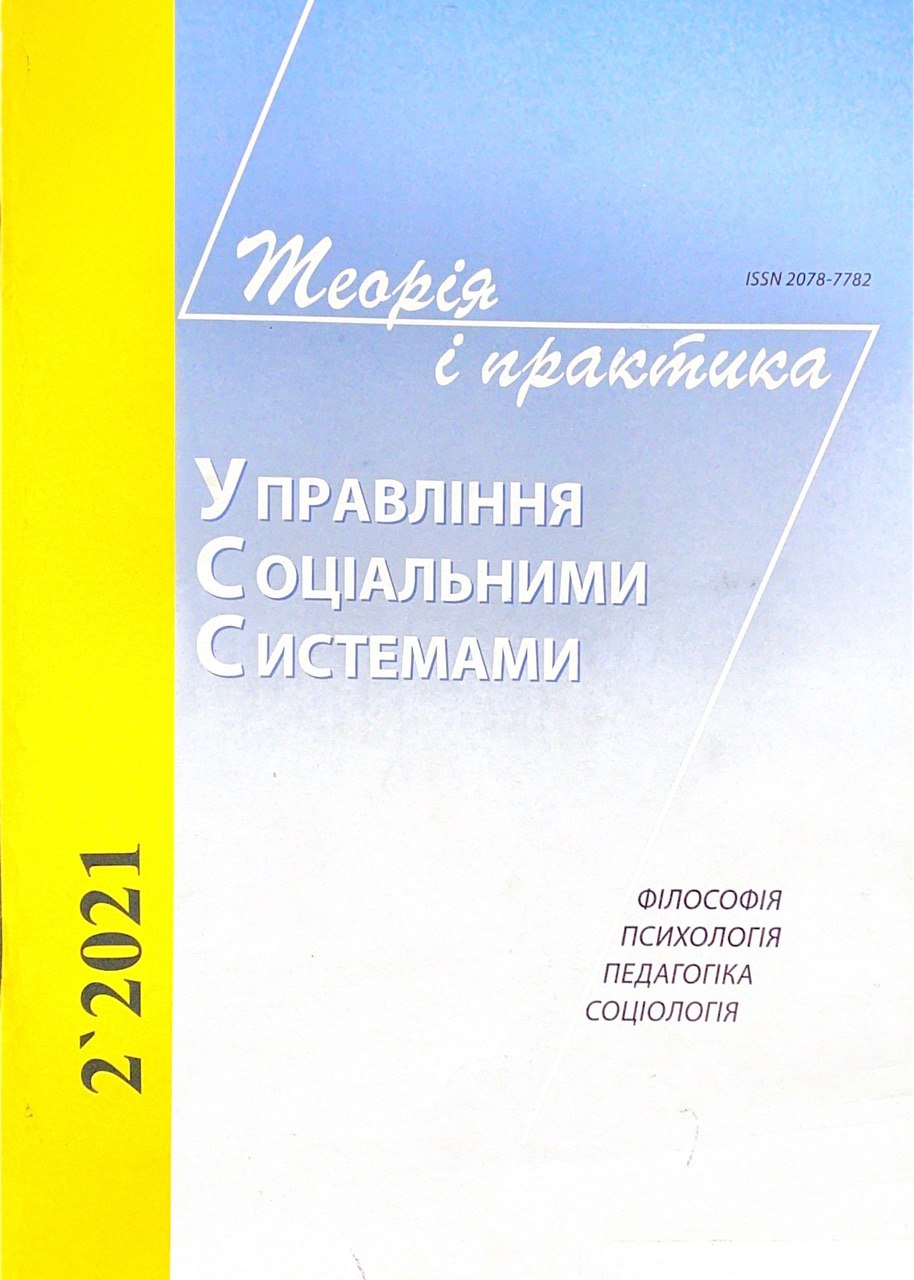ПСИХОЛОГО-ПЕДАГОГІЧНІ УМОВИ ФОРМУВАННЯ ЕМОЦІЙНОГО ІНТЕЛЕКТУ У МАЙБУТНІХ ВИКЛАДАЧІВ ВИЩОЇ ШКОЛИ
DOI:
https://doi.org/10.20998/2078-7782.2021.2.01Ключові слова:
майбутні викладачі вищої школи, психолого-педагогічні умови, емоційний інтелект, тренінг, експеримент.Анотація
Стаття присвячена розгляду такої актуальної проблеми як формування емоційного інтелекту у майбутніх викладачів вищої школи. У дослідженні було розроблено й обґрунтовано комплекс психолого-педагогічних умов формування емоційного інтелекту майбутніх викладачів вищої школи. Кожна з психолого-педагогічних умов була забезпечена комплексом різноманітних форм, методів і засобів навчання, які дозволили створити емоційно забарвлене освітнє середовище. За допомогою експериментальної перевірки була доведена доцільність їхнього впровадження в реальний освітній процес підготовки майбутніх викладачів вищої школи. Аналіз отриманих результатів показав, що рівень емоційного інтелекту майбутніх викладачів вищої школи підвищився.
Посилання
1. Andreev, V. I. (2000), “Pedagogy”, Training course for creative self-development, Ed. VI Andreev, 2nd ed., Kazan: Center for Innovative Technologies, p. 600
2. Andreeva, I. N. (2012), “Alphabet of emotional intelligence”, St. Petersburg: BHV-Petersburg,p. 288
3. Brazhnych, O. G. (2001), “Pedagogical conditions of differentiated learning of secondary school students”, dis. cand. ped. Sciences, Kryvyi Rih, p. 238
4. Nine, A. Ya. (1998), “Innovations in education: a monograph”, Chelyabinsk: IPR MO RF, p. 288
5. Veritova, O. S. (2019), “Development of emotional intelligence of future teachers of higher school in the process of master’s training”, dis. … cand. ped. Sciences: 13.00.04, Theory and methods of professional education, Classic private university, Zaporozhye, p. 235
6. Wojciech, I. V. (2017), “Formation of emotional competence of future psychologists in the process of professional training”, dis. ... cand. ped. sciences: 13.00.04, Theory and a technique of professional education, Khmelnitsky humanitarian and pedagogical academy, Khmelnytsky, p. 337
7. Volkova, N. P. (2007), “Emotional intelligence as an integral property that ensures the competence of the future teacher in the implementation of professional and pedagogical communication”, Pedagogy and psychology of creative personality formation: problems and searches: coll. science. pr./redkol, THOSE. Sushchenko and others, Zaporozhye, issue. 41, p. 388
8. Galitsan, O. A. (2010), “Formation of pedagogical facilitation of future teachers in the process of education in higher education”, dis. … cand. ped. sciences: 13.00.04, Theory and methods of professional education, South Ukrainian State Pedagogical University named after KD Ushinsky, Odessa, p. 278
9. Gapiychuk, I. M. (2003), “Pedagogical conditions of emotional interaction “teacher-student” in the learning process at the classical university”, dis. … cand. ped. science: 13.00.04. Odessa, p. 280
10. Gardner, G. (2007), “The structure of the mind”, the theory of multiple intelligences. Moscow: Williams,. p. 512
11. Derevyanko, S. P. (2009), “Emotional intelligence as a factor of sociopsychological adaptation of the individual to the student environment”, author. dis. ... cand. psychol, Science: 19.00.05, Kyiv, p. 20
12. Zarytska, V. V. (2014), “Emotional intelligence as a component of a person’s readiness for professional activity. Bulletin of G. S. Skovoroda, Kharkiv National Pedagogical University, Psychology, vip. 49, pp. 42–51
13. Lemberg, B. (2013), “Emotional intelligence: how the mind communicates with the senses”, Vector: SPB, p. 192
14. Matiykiv, I. (2013), “Emotional competence as a psychological object of education of the personality of the future specialist of professions such as “person to person””, Pedagogy and psychology of vocational education, no. 2. pp. 144–153
15. Matiykiv, I. M. (2012), “Training of emotional competence”, teaching method. Manual, Kyiv: Pedagogical Thought, p.112
16. Training “Emotional competence”, avaiable at: http://www.uaod.org.ua/data/pdf/TU–1(4)2017–54–58.pdf
17. “Training session with elements of art therapy “Development of emotional intelligence as a basis of psychological comfort in learning””, avaiable at: https://naurok.com.ua/treningove – zanyattya – z – elementami – art – terapi – rozvitok – emociynogo – intelektu – yak – osnova – psihologichnogo – komfort – u– navchanni – 8804.html
18. Shumik, I. V. (2017), “Psychological conditions of formation of conscious choice of a way of life by senior pupils / senior pupils”, Scientific notes of NaUKMA. Pedagogical, psychological sciences and social work, t. 199, pp. 74–78, avaiable at: http://nbuv.gov.ua/UJRN/NaUKMApp_2017_199_14
19. Chemiss, C., Boyatzis, R., Elias, M. (2000), “Developments in emotional intelligence”, San Francisco: Jossey, Bass
20. Cooper, R. К.,Sawaf, А. (1997), “Executive JQ: Emotional intelligence in leadership and organizations”, New York : Grosset, Putnum, р. 376
21. Douglas, A. White, Matthew Kimmons (2019), “Clergy Education and the Development of Emotional Intelligence”, An analysis of united methodist clergy in Kentucky christian education journal, no. 16(2), pp.369–378
22. “Mind, human ability to think, especially to its higher theoretical levels. Level of mental development”, Electronic explanatory dictionary of the Ukrainian language. avaiable at: https://eslovnyk.com/%D1%96%D0%BD%D1%82%D0%B5%D0%BB%D0%B5%D0%BA%D1%82
23. Gardner, H. (1993), “Multiple intelligences”, The theory in practice, N.Y:Basic Books, p.528
24. Karpova. I. A., Moshchanskaya, T. V., Moshchanskaya, E. Y. (2020), “Development of interpreters’ emotional and empathic skills”, An interdisciplinary approach, Science for Education Today, vol. 10, no. 2, pp. 37–55 avaiable at: DOI: http://dx.doi.org/10.15293/2658-6762.2002.03
25. Matthews, G., Roberts, R. D. Zeidner, M., (2004), “Emotional intelligence”, Science and myth, Cambridge:MIT Press
26. Mayer, J. D., Salovey, P. (1995), “Emotional intelligence and the construction and regulation of feelings”, Applied and Preventive Psychology, issue.4. pp.197– 208
27. Mayer, J. D., Salovey, P. (1993), “The intelligence of emotional intelligence”, Intelligence. N.Y. pp. 433–442
28. Parker, J. D. A. (2004), “Emotional intelligence and academic success”, Examining the transition from high school to university, Personality and individual Differences, vol. 36, pp. 72–163
29. “The Future of Jobs”, Report 2020, avaiable at: http://www3.weforum.org/docs/WEF_Future_of_Jobs_2020.pdf

##submission.downloads##
Опубліковано
Номер
Розділ
Ліцензія
Авторське право (c) 2021 Олександр Романовський, Олена Романовська, Тетяна Черкашина

Ця робота ліцензується відповідно до Creative Commons Attribution-NonCommercial-NoDerivatives 4.0 International License.
Автори, які публікуються у цьому журналі, погоджуються з наступними умовами:- Автори залишають за собою право на авторство своєї роботи та передають журналу право першої публікації цієї роботи на умовах ліцензії Creative Commons Attribution License, котра дозволяє іншим особам вільно розповсюджувати опубліковану роботу з обов'язковим посиланням на авторів оригінальної роботи та першу публікацію роботи у цьому журналі.Автори, які публікуються у цьому журналі, погоджуються з наступними умовами:
